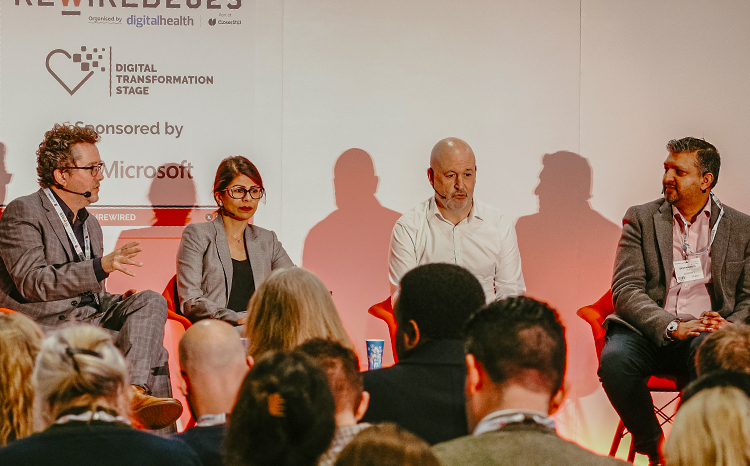‘Trust Me’, I’m the Director-General
- 27 March 2003
NHS Director-General of IT Richard Granger this week used his first major public speech to make a personal appeal to the NHS IT community, clinicians and suppliers to rally behind him and back his route map for modernising NHS IT.
In a keenly anticipated announcement he told a packed audience at HC 2003 in Harrogate that he had decided the National IT Programme will be delivered by five local service providers, based around the regional government office boundaries.
“There will be one for London and four for the rest of England,” said Mr Granger. “We hope to award the two contracts for London and another locality by October this year.” The three remaining LSP contracts will be awarded by the end of the calendar year.
The Director-General said the decision to go for a limited number of “lots” was based on the feedback he had received from strategic health authority CIOs, and would enable “meaningful deployments by the end of the calendar year.”
“There has been a lot of comment about this programme, but is there an alternative that will deliver value to the taxpayer, proceed at a reasonable pace and make use of what is out there?” Mr Granger asked the audience.
He told the audience that he wanted a genuine debate on whether there was a better alternative, and stated, “There is time to change that direction of travel.” However, he made clear his current view, “I think this is the only way we can do this.”
Mr Granger described the programme as a once in a lifetime opportunity, one which must not be missed, and pledged his commitment: “I don’t have somewhere else to go. I will make this successful.”
Seeking to allay the range of concerns of many in the audience, Mr Granger adopted a tone and language far more conciliatory than the “take no prisoners” style for which he has become famed. He repeatedly stressed the necessity of partnerships and his personal commitment to improving the NHS.
“I’m asking for your support to do this, because if we work together we will deliver it together,” said Mr Granger. “This is about what we do collectively to serve the society we are part of.”
Admitting that communications had so far been poor, Mr Granger said he had made the choice to begin by focusing on “mobilisation” of the programme and “setting a direction of travel.”
He added that while he had begun on 7 October with just one colleague. “I have now assembled a very, very strong team.” His praise for CIOs was particularly fulsome.
Mr Granger went on to announce the appointment of Kellogg, Brown and Root to deliver the Programme Management Office, Duncan McNeil to lead the Design Authority and Professor Martin Severs to act as Director of Clinical Assurance for the programme.
Over the next few months he pledged that the programme would drive into the detail, with specifications for ICRS versions one, two and three due shortly.
Speaking of the difficulties faced, Mr Granger said there were an awful lot of vested interests in the status quo and in other strategic directions, creating a difficult environment to work in. However, he sought to assure NHS IT staff, existing suppliers and new suppliers they were all vital and valued.
Directing his message to NHS IT staff he stated, “People in the NHS, be in no doubt I understand you are essential to deliver this programme.”
He next told existing suppliers,”You already do great things.” This needed to be built on, he said, by increased scale, scope and interoperability of systems. “We are talking about joining things up and not saying we will wipe the board clean.”
Seeking to allay widespread supplier concerns about being frozen out of a new market dominated by a handful of giants Mr Granger said, “This is not about entering into a new hegemony.”
He stressed that the new £2.3 billion of IT investment money was additional money, above and beyond the £850 million the NHS already spent each year on NHS IT. The Director General told the audience that analysis of current spending showed there was no “planning blight.”
Turning to new suppliers Mr Granger described the 99 responses to the OJEC for local service providers as “a turning point in the NHS being seen as a viable market.”
But he went on to spell out to suppliers, new and old, that they needed to step up to a new mark, “I want a raising of the probability that things get delivered on time and increased co-operation.”
He promised dramatic improvements in the NHS procurement process, but made clear this would have to be reflected in lower unit prices, “We are not paying a very high cost of entry to get something that is very high cost to maintain and interface with other systems.”
“I’m going to do what I did with Congestion Charging and run the procurement right through to financial closure. That, together with the timetable, will serve the NHS and supplier community well.”





